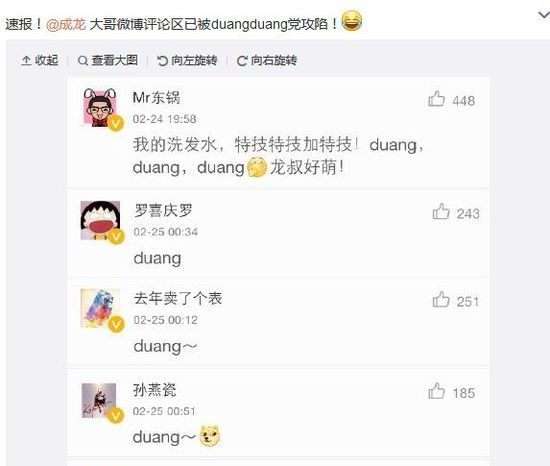

A screenshot of Jackie Chan's Sina Weibo account. (Photo/weibo.com)
If you want to express something so unbelievable that it must have been a special effect, you have a new word to add to your vocabulary.
It's "Duang", an onomatopoetic word which doesn't correlate with any particular Chinese character and refers to special effects.
A video parody adapted from a shampoo commercial featuring Hong Kong actor Jackie Chan went viral online, leading Internet users to coin the word.
The video begins with Chan flashing his black, sleek hair, which would have been flawless except that it was not his real hair, to the tune of online hit, "My Skating Shoes", known for its coarse melody and the singer's strong southern Mandarin dialect.
Next, a smug Chan confesses, to the repetitive, rhythmical sounds of "Duang", "I refused to endorse this product when they first came to me because of my thin hair, but the director insisted, saying special effects could be used to make my hair look healthy on the screen. Now you see. It's all special effects. It's not real."
The original advertisement became the target of regulators' crackdown for overhyping the effects of the shampoo after it was broadcast in 2004.
"Duang" has now became one of the hottest hashtags on Sina Weibo, a Twitter-like Chinese social networking site amid a frenzy of posts imitating Jackie Chan's speech in different scenarios.
Jackie Chan's Weibo account was flooded with comments containing the word in this sweeping online trend.
The video came at a time when the renowned movie star has been under public scrutiny after trying to salvage the drug scandal-tainted image of his son, Jaycee Chan, who was released from prison this week.
Data from Baidu also proved the phrase's popularity as it has been searched more than 586,000 times as of Thursday on the major Chinese search engine.
It's not the first time that online slang has invaded the regular lexicon in China.
The word of gei li's sudden rise in 2010 caught the attention of international media when it coined the word's official translation – gelivable – to describe something cool or awesome.
Copyright ©1999-2018
Chinanews.com. All rights reserved.
Reproduction in whole or in part without permission is prohibited.